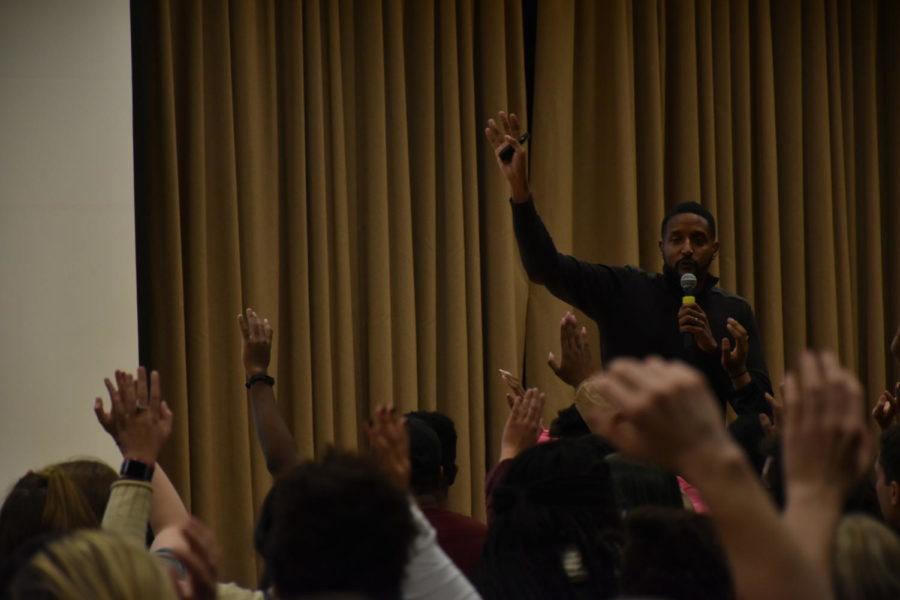Putting the pieces together: event educates on the black and multicultural greek communities
Speaker Rasheed Ali Cromwell taking a poll of Greek-Life students at his Tuesday night talk, titled “All We Do is Step, Stroll, Hop + Salute?!”, on Multicultural Greek-Life impact.
January 31, 2018
Sorority and fraternity members of every council filled the Sun Room in the Memorial Union Tuesday night to experience a stereotype-shattering presentation given by Rasheed Ali Cromwell, countering ignorance, appropriation and miseducation.
According to The Harbor Institute, Cromwell is one of the leading authorities on fraternity and sorority life on college campuses. He became a member of Omega Psi Phi Fraternity during his freshman year at North Carolina Agricultural and Technical State University and has spoken at over 225 colleges and universities in 36 states. He is also the author of the book series “The Miseducation of the Black Greek.”
Being a greek life expert, Rasheed had a lot to to contribute to the conversation circling around an important question: “What is a black and multicultural greek organization?”
For over 100 years, the black and multicultural greek-letter fraternities and sororities have contributed to society on local and national levels.
“A lot of the great leaders in our country, past and present, a lot of them started their leadership experience in these organizations and they started that service mission,” said Dr. Martino Harmon, senior vice president for Student Affairs and an active alumni of Alpha Phi Alpha Fraternity, Inc. “So if you look at Martin Luther King [Jr.], Jesse Jackson…many of the great civil rights leaders, but also people who are leaders now are in and apart of these organizations. They’ve contributed by changing society.”
Harmon also emphasized the local impacts of Iowa State’s black and multicultural greek-letter organizations.
“Here at Iowa State, what it does is it involves a sense of community and it helps serve other students at Iowa State, but also keeps students focused and gives them a sense of support,” he said.
However, the public and even other greek councils aren’t fully educated on the historical significance of these organizations and their members. Cromwell and others want people to know there is so much more to the black and multicultural greek community than stepping and strolling.
Movies like “Stomp The Yard” have had a hand in misrepresenting these organizations.
“When I originally saw it [Stomp The Yard] I thought it was fantastic,” said Amber Abogunrin, senior in apparel merchandising and design and member of Sigma Gamma Rho Sorority, Inc. “But now, going back and watching it as a member of a black greek-letter organization, or just being a part of the greek community in general, I don’t think they did a good enough job of showcasing the true meaning of what we stand for…we put our emphasis on service and giving back to the community.”
Otherwise known as the “Divine Nine,” the Multicultural Greek Council (MGC) upholds the ideals of friendship, equity and diversity through their actions and words. In 2017, the president of Sigma Lambda Gamma National Sorority, Inc. Britney Williams won Chapter President of the Year.
The same chapter’s adviser, Nancy Camarillo, won Chapter Adviser of the Year in 2017. According the the Sorority and Fraternity Community Membership Statistics Fall 2017 Annual Report, the number of members in the MGC at Iowa State has grown 98 percent since the fall semester of 2009.
The National Pan-Hellenic Council (NPHC) fraternities and sororities pride themselves in their unanimity of thought and action. In 2017, the adviser of Delta Sigma Theta Sorority, Inc. Nicole Bartolozzi won Chapter Adviser of the Year and Barbara Woods was a Hall of Fame Inductee. In 2017, Kierrah Williams won NPHC Chapter President of the Year for her chapter, Zeta Phi Beta Sorority, Inc. NPHC’s membership has increased by 53 percent since the fall semester of 2010.
Racial disparities have caused major gaps in how MGC and NPHC organizations thrive on college campuses. In the early 1900s, these organizations were not able to acquire housing.
“As a person of color, you couldn’t even get a house individually, not organizationally until 1964, 1965 when you had congressional legislation for the Fair Housing Act,” said Cromwell while addressing the housing gap issue. “Why doesn’t NPHC or MGC have houses? How come they’re not on Greek Row? How come they’re not related in the fraternal village? How come they don’t have a presence there? Think about this, people. Put the pieces together.”
On top of the lack of understanding of the purpose of these organizations, Cromwell also stressed that there is a lack of visibility and a lack of validity. The general public fails to see the meanings, traditions and culture behind the perspective. He stressed that when the public practices appreciation instead of appropriation, only then can positive changes begin to happen, and gaps can be closed.
Cultural exchange is a learning experience and, according to Harmon, college is the perfect time to ask questions.
“Just learn about each other,” he said.
Cromwell encourages people all across the country to have those conversations to get a clear understanding of those meanings, traditions and cultures without glamorizing or romanticizing them.
“Once you start to understand the culture and the history, it rises and increases your awareness and your level of respect because you realize that these are things in traditions that are unique, not just to the organizations, but to the people who are a part of them,” Cromwell said.

















